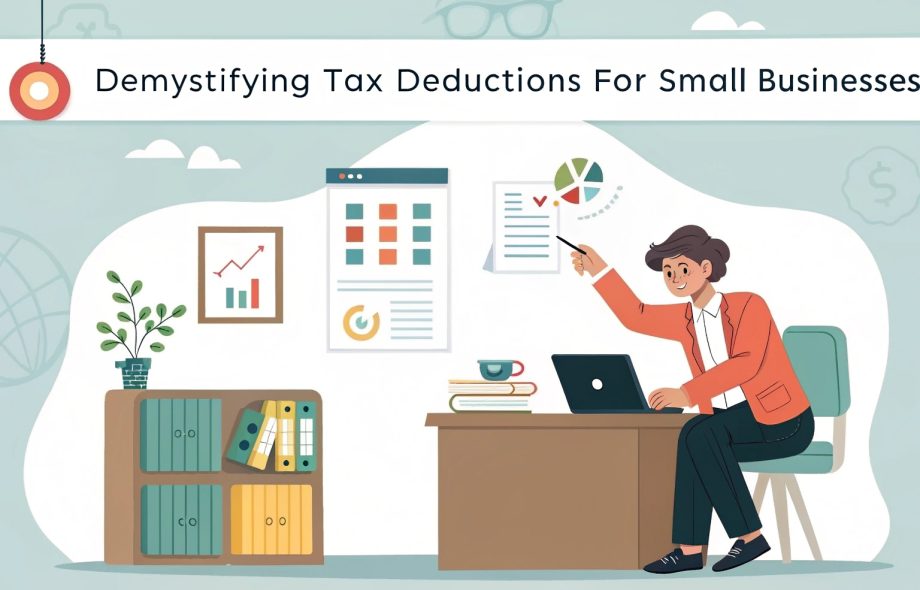Understanding tax deductions is essential for small business owners looking to minimize their tax liability and maximize profits. With the right knowledge and tools, you can identify deductions that apply to your business and ensure compliance with tax laws. This guide breaks down the key aspects of tax deductions for small businesses, offering practical tips to streamline the process. Utilizing professional accounting services can also make a significant difference in optimizing your tax strategy.
What Are Tax Deductions?
Tax deductions are expenses that businesses can subtract from their total income to reduce their taxable income. These deductions, outlined by tax authorities, aim to support businesses in managing operational costs while encouraging compliance with tax laws.
Importance of Tax Deductions for Small Businesses
Lower Tax Liability: Reduce the amount of income subject to taxation.
Increase Profitability: Retain more revenue by minimizing tax expenses.
Encourage Business Growth: Free up resources to invest in expansion.
Simplify Financial Planning: Leverage deductions to forecast and manage budgets effectively.
Common Tax Deductions for Small Businesses
1. Home Office Deduction
What It Covers: Expenses related to using a portion of your home exclusively for business purposes.
Examples: Rent, utilities, property taxes, and maintenance costs.
Tip: Keep detailed records of your workspace measurements and related expenses.
2. Business Equipment and Supplies
What It Covers: Purchases of tools, machinery, and office supplies necessary for operations.
Examples: Computers, printers, desks, and software subscriptions.
Tip: Depreciate larger assets over their useful life to maximize deductions.
3. Travel Expenses
What It Covers: Costs incurred while traveling for business purposes.
Examples: Airfare, hotel stays, transportation, and meals.
Tip: Maintain a log of travel dates, purposes, and receipts for verification.
4. Advertising and Marketing
What It Covers: Costs associated with promoting your business.
Examples: Online ads, website design, social media campaigns, and business cards.
Tip: Track all advertising expenses to claim the full deduction
5. Professional Fees
What It Covers: Payments made to professionals for services.
Examples: Legal consultations, accounting services, and IT support.
Tip: Use reputable accounting services to ensure accurate reporting and compliance.
6. Employee Wages and Benefits
What It Covers: Salaries, bonuses, and benefits provided to employees.
Examples: Health insurance, retirement contributions, and paid leave.
Tip: Maintain clear payroll records and ensure compliance with labor laws.
7. Utilities and Rent
What It Covers: Costs for office space and necessary utilities.
Examples: Electricity, water, internet, and telephone services.
Tip: If you’re leasing an office, keep a copy of the rental agreement and utility bills.
8. Insurance Premiums
What It Covers: Premiums for business-related insurance policies.
Examples: General liability, property, and workers’ compensation insurance.
Tip: Consult with an insurance advisor to identify policies eligible for deductions.
9. Training and Education
What It Covers: Costs of professional development and employee training.
Examples: Online courses, certifications, and workshops.
Tip: Retain certificates and receipts as proof of expenditure.
10. Charitable Contributions
What It Covers: Donations made to eligible non-profit organizations.
Examples: Monetary contributions, goods, or services.
Tip: Verify the eligibility of organizations and obtain acknowledgment receipts.
How to Claim Tax Deductions Effectively
1. Maintain Accurate Records
Organize receipts, invoices, and financial statements.
Use digital tools or software for seamless record-keeping.
2. Understand Eligible Expenses
Review tax guidelines to identify deductible expenses.
Consult with professionals offering accounting services for clarity.
3. Separate Personal and Business Finances
Use dedicated accounts for business transactions.
Avoid mixing personal expenses with business finances.
4. File Taxes on Time
Adhere to filing deadlines to avoid penalties.
Plan for quarterly tax payments if required.
FAQs
1. What expenses qualify as tax deductions for small businesses?
Qualifying expenses include those that are necessary and ordinary for running your business. Examples include rent, utilities, advertising, and professional fees.
2. Can I deduct personal expenses used partially for business?
Yes, but only the portion used exclusively for business purposes. For example, if you use your vehicle for both personal and business purposes, you can claim the business-related mileage.
3. Why should I hire professional accounting services?
Accounting services ensure accurate financial records, help identify eligible deductions, and provide compliance with tax laws. This reduces the risk of errors and penalties.
4. Are start-up costs deductible?
Yes, you can deduct start-up costs such as market research, business registration fees, and promotional expenses. Certain costs may need to be amortized over time.
5. How do I track expenses effectively?
Use digital tools like accounting software or mobile apps. Categorize expenses and retain digital copies of receipts and invoices for easy access during tax season.
Conclusion
Tax deductions are an invaluable tool for small businesses to reduce taxable income and improve financial health. By understanding and leveraging deductions, maintaining accurate records, and seeking guidance from professional accounting services, you can simplify the tax filing process and achieve long-term financial success. Start organizing your finances today to make the most of available deductions and ensure compliance with tax regulations.

